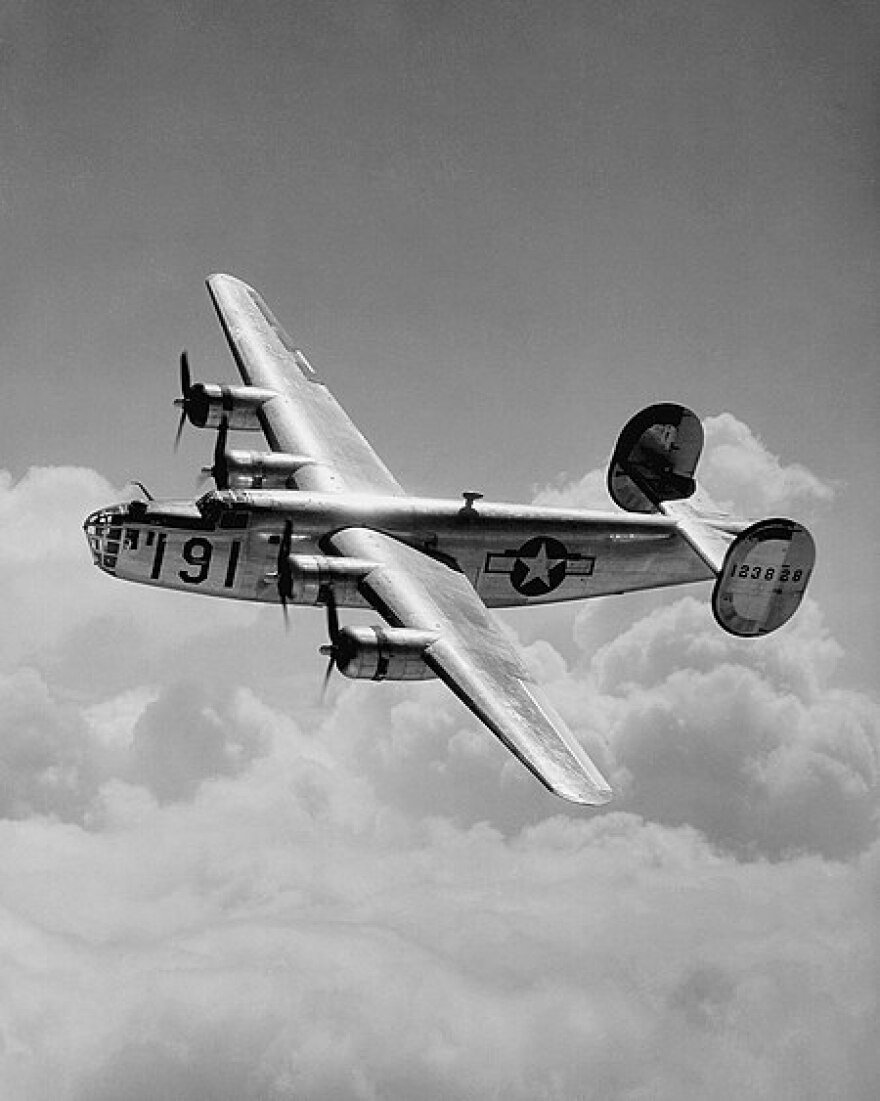Commentary: There were 18,500 of the B-24 planes on missions in World War II. The few that are left are in museums now except for one B-24 in the world that can still fly and Ralph Hackey, with his sons and grandson, went up in it five years ago when the plane came to Las Cruces. For $300, anyone could have a ride in it and feel its history.
In the co-pilot seat, Ralph flew over the Valley he has farmed since coming back from the war. His sons Don and Jim and his grandson Luke joined him on the flight, not only to experience the last plane of its kind but to appreciate the fact that their dad and grandfather was one of the B-24 bomber pilots flying over Germany who made it back home from the war. They live because Ralph survived.
It was a special day for all of them. The old B-24 flew over the farm in Rincon that Ralph and his wife Ruth bought in 1946 when he came back from the war. It flew over Las Cruces where Ralph got his pilot's license when he took part in the Aviation Pilot Program at NMSU. Ruth and Ralph met in college and then married when he graduated. Ruth went to work and Ralph went to war.
After the war, they bought the farm in Rincon. They acquired more farms along the way, growing food for a post-war economy but have sold all of the farms now but the original homestead where Ralph still lives. He enjoys morning coffee at the Pepper Pot with the other farmers in the Valley and then spends his day with Ruth, who now resides at Mom and Pop's Assisted Living. It was in her room that he showed me the great pictures of his 90th birthday celebration at the lake with all of his family, and then, later in the conversation, the pictures of a demolished German city.
Pilot license in hand, Ralph volunteered soon after the war was declared on Dec. 7, 1941 after Japan's surprise attack on Pearl Harbor. The Air Force called him several months later to train him for the bombing missions. From his base in Norwich, England (100 miles northeast of London) he and the other pilots flew over Germany several times each week as weather allowed.
Ralph completed 35 bombing missions and was in London when the end of the war was announced. "It was quite a party," he said in his soft-spoken, reserved way.
Five days after the war was over, Ralph flew his ground crew 500-1,000 feet above the Ruhr Valley up to Cologne where the city was destroyed from the saturation bombing. Miraculously, the Cologne Cathedral still stood. Its stained glass windows had been removed and stored in the mountains outside of Cologne, so they, too, withstood the war. As a 2,000 year-old city and Germany's fourth largest, the population of Cologne went from 800,000 to 40,000. It was 1959 before its population was back to 800,000.
The World War II casualties are mind-numbing; nearly 70 million died in the war and over half were civilians. It seems ironic that six million German soldiers were killed so the Nazis could murder six million Jews since the whole murderous scheme was to propagate more Aryans. In this most terrible of all wars with its atrocities, germ warfare and atomic bombs, a million American soldiers were either killed or wounded. Germany started the war, and America finished it.
As I say goodbye, Ralph tells me he doesn't want the column to be rosy, since there isn't anything rosy about war.
I wouldn't willingly make such a mistake since I know "Cactus Jack," Jack Anderson of Roswell who served on the USS Arizona with his twin brother who died on the opposite end of their battleship. Jack once described the bombing of Pearl Harbor as "looking into the eyes of Hell."
And because all of mankind's recorded history is a cycle of becoming oppressed and then breaking free of oppression, Ralph doesn't want to be seen as a hero through a detailed account of his bombing missions or by describing the valor required to fly into a war zone. He was there at the time the world was fighting oppression. "So many went into World War II," he said. He'd rather be seen as a farm kid getting into a plane.
Editor's note: This week, the people of Hatch celebrated Ralph Hackey's 100th birthday. As the nation faces new challenges, we remember and honor the heroes of World War II.


